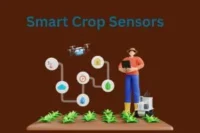5 Benefits of Organic Farming That Will Inspire You to Make the Change
Published: 18 Mar 2025

In this article, we’ll explore 5 key benefits that will motivate you to consider organic farming as a choice for a healthier lifestyle and a greener planet.
Organic farming is not just a method of growing food; it’s a movement that is transforming the agricultural landscape and our relationship with the environment. As more people become aware of the health and environmental benefits, organic farming is gaining traction worldwide. From offering healthier food choices to fostering a more sustainable future, the advantages of organic farming are truly inspiring.
So, guys, without wasting time, let’s jump into the article to learn 5 benefit of organic farming.
1.Better for Your Health
Organic farming ensures that food is grown without synthetic chemicals like pesticides or herbicides, which can pose health risks. Organic food is free from harmful additives, and animals raised organically are not treated with growth hormones or antibiotics. This results in fewer toxins in your food, lower risks of allergies and chronic illnesses, and higher nutrient content in your meals.
Key Points:
- Free from synthetic pesticides and chemicals.
- No antibiotics or growth hormones in animal products.
- Reduces the risk of chronic illnesses like cancer.
- Higher nutrient density and antioxidant levels.
2. Supports Biodiversity
Organic farming encourages a balanced ecosystem, promoting the health of pollinators, wildlife, and beneficial insects. By eliminating harmful chemicals and using sustainable practices, organic farms foster biodiversity, improve soil health, and help maintain natural ecosystems.

Key Points:
- Promotes healthy habitats for pollinators like bees and butterflies.
- Reduces harm to beneficial insects and wildlife.
- Uses crop rotation and intercropping to preserve biodiversity.
- Improves soil health and microbial diversity.
3. Saves the Environment
Organic farming practices prevent soil erosion, improve soil fertility, and reduce the use of harmful chemicals that pollute water sources. By maintaining healthier soils, organic farming promotes water conservation and reduces the environmental impact of farming.
Key Points:
- Reduces soil erosion through sustainable practices.
- Improves soil fertility using natural methods.
- Prevents water pollution by avoiding harmful chemicals.
- Enhances water retention, reducing irrigation needs.
4. Improved Taste
Organic produce tends to be more flavorful because it’s grown in nutrient-rich soil without synthetic chemicals. The absence of artificial additives allows the natural taste of the food to shine through, resulting in a fresher, richer flavor that’s more satisfying.

Key Points:
- Higher nutrient density leads to more flavorful produce.
- No artificial preservatives or chemicals that affect taste.
- Organic food lasts longer, reducing food waste.
- Authentic, natural flavors that are richer and more complex.
5. Sustainable for the Future
Organic farming is designed with sustainability in mind. It uses renewable resources, mitigates climate change by sequestering carbon, and empowers local communities by supporting small, family-run farms. This makes organic farming a future-proof solution for ensuring healthy food systems.
Key Points:
- Preserves soil and land for future generations.
- Uses renewable resources and sustainable practices.
- Helps mitigate climate change by storing carbon in soil.
- Supports local farmers and promotes fair trade.
Conclusion
Organic farming offers profound benefits that extend far beyond the fields. By choosing organic, you are making a powerful statement for the future—one that values health, sustainability, and the planet. Whether you’re motivated by the desire to eat healthier, reduce your environmental impact, or preserve biodiversity, organic farming is the path forward.
Take the leap into organic farming and become part of a global movement that is transforming agriculture for the better. The choice to go organic is not just about farming—it’s about nourishing the Earth and creating a legacy of health, sustainability, and abundance for generations to come.
FAQs about Benefit Of Organic Farm
Here are some of the most frequently asked questions about the 5 Benefit of organic farm.
Organic farming offers numerous benefits, including better health outcomes, improved environmental sustainability, and enhanced biodiversity. Key advantages include:
- Healthier food: Organic crops are free from harmful pesticides and chemicals, reducing health risks.
- Environmental protection: It promotes soil health, prevents erosion, and conserves water.
Organic farming reduces the impact on the environment by avoiding synthetic pesticides and fertilizers that harm ecosystems. It promotes:
- Soil conservation: Organic methods, like crop rotation and composting, help maintain soil fertility.
- Water preservation: Organic farming uses fewer chemicals that pollute water sources.
Organic food is healthier due to the absence of harmful chemicals, growth hormones, and antibiotics often used in conventional farming. Organic food is:
- Free from synthetic pesticides and fertilizers.
- Higher in nutrients: Studies show organic produce often has more vitamins, antioxidants, and minerals.
Yes, organic farming is known to boost biodiversity. Unlike conventional farming, which may harm ecosystems, organic farming promotes:
- Habitats for wildlife: By avoiding chemicals, organic farms become safe havens for pollinators like bees and butterflies.
Organic farming plays a critical role in creating a sustainable food system by focusing on long-term soil health, resource conservation, and environmental preservation. Key contributions include:
- Renewable resources: Organic farming uses natural, renewable resources, unlike conventional methods that rely on synthetic inputs.

- Be Respectful
- Stay Relevant
- Stay Positive
- True Feedback
- Encourage Discussion
- Avoid Spamming
- No Fake News
- Don't Copy-Paste
- No Personal Attacks

- Be Respectful
- Stay Relevant
- Stay Positive
- True Feedback
- Encourage Discussion
- Avoid Spamming
- No Fake News
- Don't Copy-Paste
- No Personal Attacks






